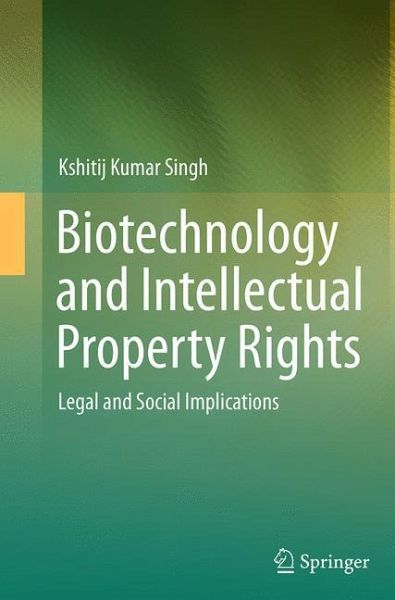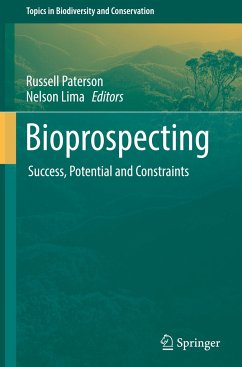
Biotechnology and Intellectual Property Rights
Legal and Social Implications
Versandkostenfrei!
Versandfertig in 6-10 Tagen
38,99 €
inkl. MwSt.
Weitere Ausgaben:

PAYBACK Punkte
19 °P sammeln!
This book offers a valuable contribution to contemporary legal literature, providing deep insights into the interface between law and genetics, highlighting emerging issues and providing meaningful solutions to current problems. It will be of interest to a broad readership, including academics, lawyers, policy makers and scholars engaged in interdisciplinary research.In the context of examining and analyzing the legal and social implications arising from the recent conjunction of biotechnology and intellectual property rights, the book particularly focuses on human genes and gene variations. E...
This book offers a valuable contribution to contemporary legal literature, providing deep insights into the interface between law and genetics, highlighting emerging issues and providing meaningful solutions to current problems. It will be of interest to a broad readership, including academics, lawyers, policy makers and scholars engaged in interdisciplinary research.
In the context of examining and analyzing the legal and social implications arising from the recent conjunction of biotechnology and intellectual property rights, the book particularly focuses on human genes and gene variations. Emphasis is placed on "patent law," as a considerable percentage of genetic inventions are covered by patents. The book presents a comparative and critical examination of patent laws and practices related to biotechnology patents in the United States, Canada, European Union and India, in order to gather the common issues and the differences between them. The international patent approach regarding biotechnology is also analyzed in light of the constant conflict between differentiation and harmonization of patent laws. The book highlights the potential gaps and uncertainties as to the scope of numerous terms such as invention, microorganisms, microbiological processes, and essential biological processes under TRIPS. Also analyzed are the social and policy implications of patents relating to genetic research tools and genetic testing. The intricacies involved in providing effective intellectual property protection to bioinformatics and genomic databases are also examined. Bearing in mind the collaborative nature of bioinformatics and genomic databases, the book evaluates the pros and cons of open biotechnology and assesses the implications of extending intellectual property rights to human genetic resources, before explaining the ownership puzzle concerning human genetic material used in genetic research.
In the context of examining and analyzing the legal and social implications arising from the recent conjunction of biotechnology and intellectual property rights, the book particularly focuses on human genes and gene variations. Emphasis is placed on "patent law," as a considerable percentage of genetic inventions are covered by patents. The book presents a comparative and critical examination of patent laws and practices related to biotechnology patents in the United States, Canada, European Union and India, in order to gather the common issues and the differences between them. The international patent approach regarding biotechnology is also analyzed in light of the constant conflict between differentiation and harmonization of patent laws. The book highlights the potential gaps and uncertainties as to the scope of numerous terms such as invention, microorganisms, microbiological processes, and essential biological processes under TRIPS. Also analyzed are the social and policy implications of patents relating to genetic research tools and genetic testing. The intricacies involved in providing effective intellectual property protection to bioinformatics and genomic databases are also examined. Bearing in mind the collaborative nature of bioinformatics and genomic databases, the book evaluates the pros and cons of open biotechnology and assesses the implications of extending intellectual property rights to human genetic resources, before explaining the ownership puzzle concerning human genetic material used in genetic research.














